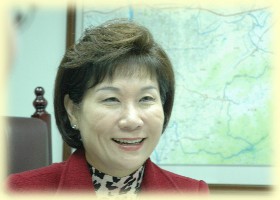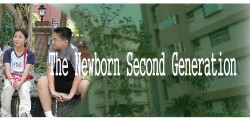 |
| Name
ˇG |
Li-Geng Guei-Fong |
| Origin of Ancestors ˇG |
Henan , China |
| Place of Birth ˇG |
Shandong, China |
| Occupation ˇG |
Alderman of Taipei City |
| |
|
|
ˇ§In addition to serve ordinary citizen, I pay special attention to honor soldiers, Hakas, low-income families, because I was from a poor military family, I have to speak for those weaker minorities.ˇ¨ |
|
| |
|
During the less than two-hour interview with aunt Li-Geng Guei-Fong, we realized how busy a public representative could be: people coming for pleading, contact with government officials, interview from journalists, preparing meeting materialsˇK, although our interview was interrupted several times, we also knew that it's not easy to be a good public representative. |
|
Aunt Li-Geng's father was a colonel of the army with upright personality and responsible. As he was too busy and tired at work, he had paralysis since his prime age of 41 years old. Since then, he was sick abed supported by little pension. The income source of the family was lost, and aunt Li-Geng was only ten. She is the eldest among siblings, and she was not frustrated facing this tough environment. She did the family chores and took care of kids, never spent a cent from the family but earned tuitions by part-time jobs and scholarships until her graduation of the foreign affairs graduate school of National Chengchi University. |
|
Prior to be a alderman, aunt Li-Geng was the director of the language center in National Chengchi University . Two factors made her change career to politics field. One is that she understands the taste of poverty and difficulty of struggling. You can develop meritocracy as a teacher but being a public representative can help more poor people and those who need assistance. The other reason is that when she attended the young camp activities at university, she talked face-to-face with the Premier of Executive Yuan, Jiang, Jing-Guo, at that time. He encouraged young people of noble aspirations stepping out for the country and serving the public, which stuck her deeply. |
|
ˇ§In addition to serve ordinary citizen, I pay special attention to veterans, Hagas, low-income families, because I was from a poor military family, I have to speak for those weaker minorities.ˇ¨ Aunt Li-Geng said. |
|
Aunt Li-Geng grew up in Miaoli and speaks fluent Haka; she is proud to be the ˇ§daughter of Hakaˇ¨. She thinks Hakas and veterans are weaker minorities in the current situation. It's a good sign that Haka culture is valued gradually in recent years. |
|
|
ˇ§Speaking for veterans or hakas is neither to emphasize racial consciousness, nor to fight for their privilege; it is to hope to earn the deserving respect and rights in this diverse Taiwan society and to pay attention to the cultural heritage.ˇ¨ Aunt Li-Geng particularly emphasized this point. |
Aunt Li-Geng has done a lot for the honor soldiers everyday. For example, she won over three million dollars of annual emergency relief assistance for the veterans; the cultural affairs bureau will hold ˇ§Cultural Festival of Military Dependents' Villageˇ¨ nest year; the language classes for China brides for the next generation education; internet connection at the digital cultural park of military dependents' village, etc. Her passion could be proved through the mouths of veteran grandpas we've interviewed, they complimented her as a ˇ§alderman with a warm heart and efficiencyˇ¨. |
|
ˇ§There are about 80 thousand honor soldiers, and about 6 to 7 thousand of them are over ninety years old. Most of them do not have spouses and dependents. They've strived in Taiwan for almost sixty years. If their voices and faces are not captured, they will be disappearing in the future.ˇ¨ Aunt Li-Geng sighed with emotion. |
|
Aunt Li-Geng's saying matches perfectly with our topic. We think our society needs more people to care for all the weaker minorities together. |
|
|
|
| |
|
|
 |
|



